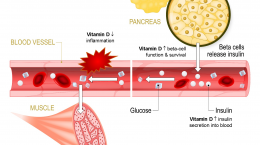Published on March 1, 2023
Many individuals are unaware that they have prediabetes or are already diabetic. Watch this short video on a recent meta-analysis showing how vitamin D reduces the risk of type 2 diabetes and prediabetes, and take steps to measure your status and reduce your risk!
Key Points
- 25% of those with diabetes and 90% of those with prediabetes are unaware of their diagnosis; diabetes itself is the leading cause of kidney failure, non-traumatic lower limb amputations, and new cases of blindness among adults and is the seventh leading cause of death in the United States
- A new meta-analysis on vitamin D and type 2 diabetes found a 76% reduced risk of diabetes among individuals with prediabetes who maintained a vitamin D blood level of at least 50 ng/ml (125 nmol/L) compared to those with a vitamin D level of 20-29 ng/ml (50 to 74 nmol/L)
- A blood test for HbA1c can help determine one’s risk for diabetes and pre-diabetes

In the United States, diabetes affects more than 30 million people, with Type 2 diabetes accounting for 90-95% of cases. Additionally, more than a third of US adults (84 million) have prediabetes, and many people with diabetes don’t even know they have it (25% of those with diabetes and 90% of those with prediabetes).
A diabetes diagnosis comes with life-long consequences; it is the leading cause of kidney failure, non-traumatic lower limb amputations, and new cases of blindness among adults and is the seventh leading cause of death in the United States.
Vitamin D supplementation has been found to reduce insulin resistance by 15% and reduce the risk of type 2 diabetes by 40-60% with achieved vitamin D blood levels of 40-60 ng/ml (100-150 nmol/L). Further, GrassrootsHealth published an analysis in 2016 that found that the incidence of type 2 diabetes was 60% lower in the GrassrootsHealth cohort, whose average vitamin D level was 41 ng/ml (103 nmol/L), compared to the U.S. population, whose average level was 22 ng/ml (55 nmol/L), after adjusting for age, gender, race, smoking status, and BMI. There is much research describing HOW vitamin D is involved in type 2 diabetes development and progression, and why it could help in its prevention.
Featured Video: Vitamin D and Diabetes
A new meta-analysis on vitamin D and type 2 diabetes found a 76% reduced risk of diabetes among individuals with prediabetes who maintained a vitamin D blood level of at least 50 ng/ml (125 nmol/L) compared to those with a vitamin D level of 20-29 ng/ml (50 to 74 nmol/L).
In the video featured below, Dr. John Campbell reviews this study titled “Vitamin D and Risk for Type 2 Diabetes in People With Prediabetes.” The results are astonishing!
Vitamin D and Diabetes: Video Review
Type 2 diabetes can be considered a “public health emergency;” in the United States, over 11% of the population is diabetic
Earlier death, heart and renal failure, and cardiac problems are just a few of many risks associated with diabetes
Evidence is IN on the protective effects of vitamin D, with a recent study by Pittas et al. showing a 76% risk reduction for diabetes with higher levels of vitamin D (at least 50 ng/ml vs 20-29 ng/ml)!
The study also found a 3 year absolute risk reduction of 18.1%
Functions of vitamin D include its roles in insulin secretion and glucose metabolism
Intervention studies demonstrate that if vitamin D levels are improved, the amount of diabetes goes down
Studies include protective effects of vitamin D given to adults with prediabetes
Vitamin D is safe, effective, and inexpensive!
“If we want to spend money effectively on a public health intervention, we should be testing the whole population for vitamin D levels. That would be a really cost-effective intervention, where as other massive public health interventions going on at the moment are less cost-effective in my view.”
Why is this important?
37.3 million people in US have diabetes, and those numbers are rising; 8.5 million people with diabetes have not been diagnosed, and are unaware that they have it
Chronic hyperglycemia causes pathology on a regular basis, and is damaging to cells and tissues
A simple blood test for HbA1c can help determine one’s risk for diabetes and pre-diabetes
Individuals with type 2 diabetes are more likely to die prematurely, are 2.5 times more likely to develop heart failure, and 2 times more likely to have a heart attack
Measure Your Vitamin D and HbA1c Levels as a Step Towards Reducing Your Risk of Diabetes & Prediabetes
The hemoglobin A1c (HbA1c or A1c) test was introduced to GrassrootsHealth participants as part of the Type 1 Diabetes Prevention project, and is a measure of how healthy average blood sugar levels have been in the recent few months. This particular test is a better representation of blood sugar health than a single glucose measurement, since glucose levels vary throughout the day. It can be a good indicator of glucose intolerance even in the absence of abnormal fasting glucose levels, and higher levels of HbA1c are associated with higher levels of inflammation. Watch this video for more information on the HbA1c blood test.
 Having and maintaining healthy vitamin D levels and other nutrient levels can help improve your health now and for your future. Choose which additional nutrients to measure, such as your omega-3s and essential minerals including magnesium and zinc, by creating your custom home test kit today. Take steps to improve the status of each of these measurements to benefit your overall health. With measurement you can then determine how much is needed and steps to achieve your goals. You can also track your own intakes, symptoms and results to see what works best for YOU.
Having and maintaining healthy vitamin D levels and other nutrient levels can help improve your health now and for your future. Choose which additional nutrients to measure, such as your omega-3s and essential minerals including magnesium and zinc, by creating your custom home test kit today. Take steps to improve the status of each of these measurements to benefit your overall health. With measurement you can then determine how much is needed and steps to achieve your goals. You can also track your own intakes, symptoms and results to see what works best for YOU.
Enroll in D*action and Test Your Levels Today!





